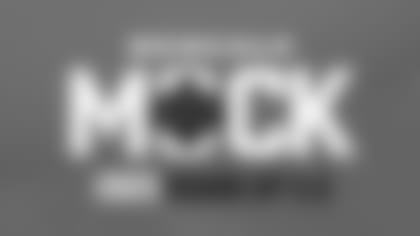With the Bengals shoring up their list of undrafted free agents set to be released when rookie minicamp opens next Friday, director of college scouting Mike Potts is the guest on Hobson's Choice podcast in which he breaks down all 10 draft picks and how they were able to execute three trades in a historic draft that received solid reviews.
Potts hits a slew of topics for us that range from why they targeted the offensive line in the first round instead of other spots and how the infusion of college coaches on new head coach Zac Taylor's staff aided the process:
On trading up twice in the fourth round to get three players in the fourth
"We had guys targeted. We didn't want other teams to make the choice for us. Maybe the guy falls to us, maybe he doesn't. We had the ability to go up and get those guys … You go into the third day of the draft we're there at pick 110 and pick 125, so you're looking at the eighth pick and 23rd pick in that round. You rank your top 23 players and we ended up getting a good number of those we had ranked in our top 23 going into day three."
When they were faced with trading up or back in the second round, the meat of the fourth-round came into play. A trade up would have yielded a premier player, but a trade down eventually gave them four solid players at spots of need. Potts, the Southeast scout who saw Alabama left tackle Jonah Williams three times before they picked him in the first round, noted his versatility at both tackle spots and professional work habits made him almost a no-brainer. In the days leading up to the draft, they thought they could get a linebacker in the third round like North Carolina State's Germaine Pratt and did.
On second round selection, TE Drew Sample
In the second round, Washington tight end Drew Sample was popular among both scouts and coaches. Potts made a West Coast swing because of the talent at Washington, Washington State and Oregon and when he returned he asked Midwest scout Bill Tobin to cross check Sample he was so impressed. "We had unanimity and conviction on Drew Sample … (The coaches) loved him just as much, if not more than our scouting staff did.
"There were definitely some linebackers we had targeted we felt good about in that third-round range," Potts says. "Anytime you give a guy a top three round grade you regard that guy as a starting caliber talent. We thought there were starting caliber (backers) available in the third round … You try to determine league value on guys … When you have guys in the league you actually trust taking players, there's some give and take in those conversations. When you feel like you have good opinion of where the league feels about certain guys, then you can go in there and attack those positional needs in certain rounds."
Potential of a pair of two, sixth-round running backs
The sixth round appeared to be fruitful with two running backs (Texas A&M's Trayveon Williams and Oklahoma's Rodney Anderson). Potts thinks have the potential to fill up the depth chart. There is also in the sixth Auburn linebacker Deshaun Davis, maybe the draft's most instinctive backer he saw on tape.
"If you had asked any of our (scouts and coaches) if they had thought one of (Williams and Anderson) would be there in the sixth round, I don't think anybody would have felt good about that," Potts said. "The thing that really struck our coaching staff with Rodney is when we interviewed a lot of (Oklahoma) players at the Senior Bowl and every one of them said Rodney was the team leader on not just the offense, but their overall team and that was after early in the year he had a season-ending (knee) injury. He's just there at practice in street clothes and the guys still regarded him as the team leader."
Impact of College Coaches On Staff
Taylor has surrounded himself with a batch of college coaches, among them James Casey at tight ends, Jim Turner on the offensive line and Tem Lukabu at linebacker. Potts says that perspective during the draft "was huge and probably even more valuable in college free agency because these guys are used to recruiting and the only time we really have to recruit is in free agency and they had (college) connections."






